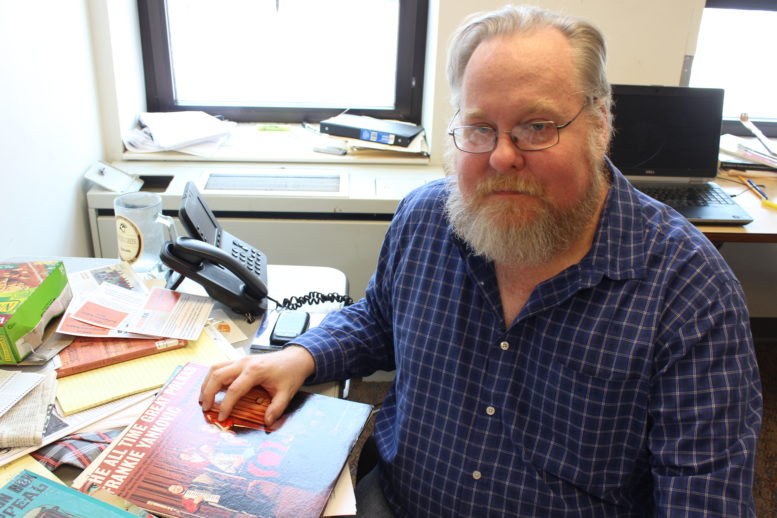By DAVID DUPONT
BG Independent News
When I arrive in David Jackson’s office in Williams Hall on the Bowling Green State campus, he’s busy doing what he’s been doing so much of since the campaign started.
He’s on the telephone talking to a reporter. In this instance, he responding to questions about Meryl Streep’s impassioned speech at the Golden Globes the night before.
Jackson, who teaches political science, has become the go-to expert for the national media on the impact of celebrity endorsements in politics. He’s found they don’t matter much, and often hurt.
Even after the election he’s still getting calls. That’s not what prompted this visit from BG Independent News, though.
I want to talk polka. For almost six years, Jackson has hosted the Sunday Morning Polka Show 10a.m. to noon, on WXUT, 88.3, and available for streaming on Mixcloud at https://www.mixcloud.com/discover/sunday-morning-polka/.
While the show includes all styles of polka as well as some related pop music, at its heart is the Polish-American polka that Jackson grew up listening to in southern Saginaw County, Michigan. His parents, especially his mother (maiden name Lazowski), listened to it. Every year it was the focal point of the festival hosted by the Catholic Church he attended.
”There wasn’t a period in my life that I didn’t listen to polka,” Jackson said.
Sure, he admits, maybe for some time as a teenager, he looked down on the music as corny. Then he came to appreciate its variety and complexity. “It’s about more than drinking beer and dancing.”
And he demonstrates that in the stream of consciousness show in which he decides on the fly which of the 25,000 polka songs stored on his computer he’ll play. Maybe he’ll play “Midnight in Moscow,” formerly a Soviet radio network theme after a New from Poland story about American troops arriving in Poland. Or he’ll do a keyword search to string together related songs. They can be brand new, or vintage vinyl, scratches and all.
Polish-American polka is, Jackson asserts, “as distinctive an American style of music as bluegrass, blues, jazz or Cajun music in the sense that it has a non-US origin that combines with other influences in the US to become this hybrid.”
But, he said, “it’s the one that gets made fun of, which I don’t like.”
The music has evolved. Polka in the 1930s and 1940s was played at a fast tempo by big bands using intricate arrangements. “It blows the walls off the place.”
The music settled down since then and was a staple of Polish-American festivals celebrating their culture.
Jackson has written research papers on how polka helped maintain a Polish identity, and about the organizations that stage festivals.
The irony, he notes, is that Poles, past and present, will be the “first, last and second” to tell anyone who asks that “polka is not a Polish phenomenon, it’s a Czech dance.”
His next polka-related project will be a survey of his fellow polka disc jockeys.
The Sunday Morning Polka Show isn’t his first foray into polka programming. He hosted a couple shows at Michigan stations. Both of those were established programs when he came on. These were brokered-time arrangements, where the air time is purchased from the station, leaving it up to the host to find advertisers to support the program. Jackson said he was a student and really didn’t have the time to make as much money off the arrangement as he could have.
Polka programming on the radio, he said, is definitely on the decline.
The Academy for Recording Arts stopped awarding a Grammy for best polka record in 2009 after more than 20 years. Interest was so low that one artist Jimmy Sturr won eight of the last 10 Grammys awarded. He did this by having country music guest artists, so he could draw votes from their fans, Jackson said.
The two years Sturr didn’t win, Brave Combo, a Texas-based band that played the Black Swamp Arts Festival in 2004, won. Some polka fans suspect the combo’s love of polka is not sincere. Jackson advised that anyone entertaining such thoughts should listen to the Brave Combo’s haunting version of the Polish National Anthem, recorded in the middle of a thunderstorm.
Despite the efforts of Brave Combo and others the music is becoming more homogenized, gravitating toward a Chicago style. In the past every region, Cleveland, Western Massachusetts, Milwaukee, had its distinctive style.
Jackson is not sure what to expect from the forthcoming polka-themed movie starring Jack Black. “The Man Who would be Polka King” is based on the true story of Jan Lewan (Lewandowski) who started off playing music and selling merchandise, and ended up scamming fans.
Maybe the film and the appeal of Jack Black will spark new interest in the music. Jackson is doubtful, and he knows something about celebrity endorsements.


